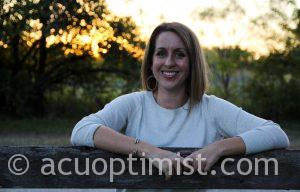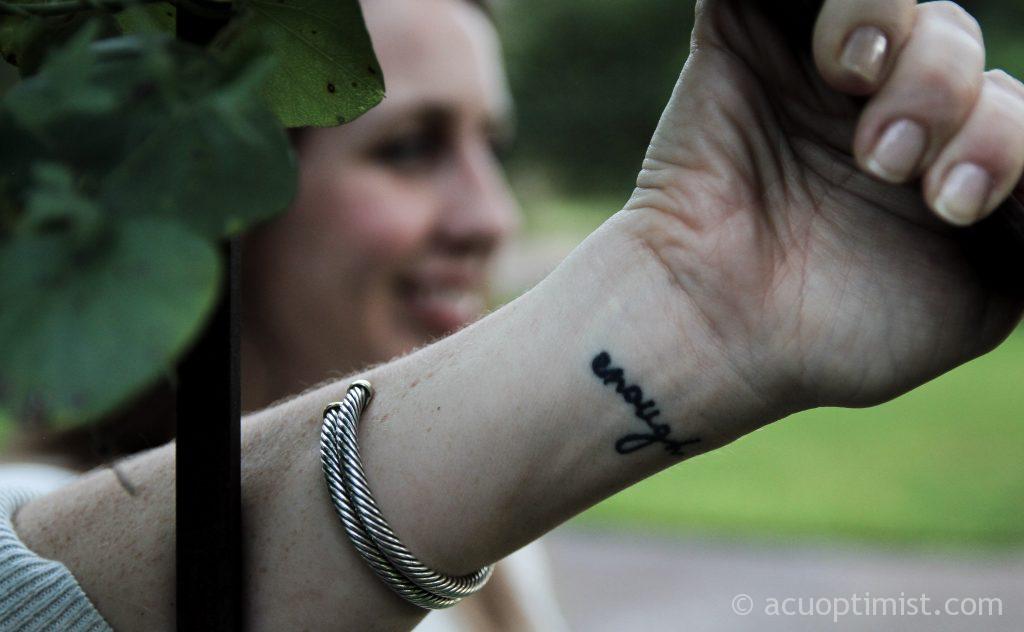Small black letters on her wrist spell the word, “Enough.”
Enough.
A reminder that she has enough, that God is enough. Rachel Riley had the word tattooed on her wrist as a reminder to remain content.
Five years ago, she chose to live one year without buying anything she didn’t need. Her fast from spending led her to a new understanding of “enough,” not only in her possessions but also in her home and relationships.

Psychology instructor Rachel Riley.
Rachel, instructor of psychology, grew up one of four sisters, wearing hand-me-downs and thrift store clothes. In high school, she wanted her own money so she worked at a mall in Beaumont and for college she wanted to go to a private institution, so she attended ACU. As a student, she felt unsatisfied with what she had, seeing a clear difference between the “haves” and the “have-nots.” While in college, she met her husband, Chris Riley, now vice president of Student Life, and graduated in 1998. Chris began practicing law at a firm in Lubbock, and Rachel said she had financial situation she always wanted. But that wasn’t enough.
Chris worked long hours, which drained the family’s relationships, Rachel said. Ten years ago, the Rileys chose to move to Abilene for a slower pace with Chris’ job as a lawyer for ACU. Their son, Jackson, was 5 years old when they moved into a house on Sayles Blvd, “old and beautiful,” just the way Rachel liked it. But it wasn’t enough.
“I’ve wanted, and I’ve chased probably my whole life, a white farmhouse,” Rachel said. “I probably was trying to chase this dream of owning a house like my grandparents’.”
Rachel said she likes to have things other people don’t have, often buying at estate sales and thrift stores. In 2011, the Rileys started searching for the “perfect” house. Meanwhile, after going on a spring break mission trip, the couple decided to try adopting a baby from Honduras.
“These people have nothing, and you feel very convicted about that,” Rachel said.
The Rileys set aside the dream of the perfect house as they planned to save money for adoption. Rachel decided to stop spending money on things she didn’t need for one year. She said she was influenced by 7: An experimental mutiny against success by Jen Hatmaker, which discusses the idea of decluttering life and living enough. The decision and later, her tattoo, were inspired by 1 Timothy 6:6-8.
“If I have bread on my table and shoes on my feet that’s enough,” Rachel said. “The general context is, you can’t take it with you.”
She sold her dishwasher, turned the space where it had been into a recycling center, and stopped using an electric dryer. Dr. Janine Morgan, instructor of Bible, who has taught Core 210 with Rachel, also doesn’t use a dryer. Instead of consuming energy to dry their clothes, Morgan and Rachel hang their clothes outside and use the West Texas dry heat and winds, or during the winter they lay the clothes on drying racks indoors.
“I remember thinking, ‘Oh, there’s somebody else like me in the world,’” Morgan said.
Changing how they did laundry was just one effect her fast had on her family. Her 11-year-old son, Jackson, calls the “no-spending” time “The Great Depression” for their family. While Rachel didn’t purchase any new clothes or toys for the children, Jackson and Alice Ann remembered one exciting tradition started during that year: playdate coupons.
Rachel’s spending fast extended to birthday gifts for friends of the children, so they had to come up with new gift ideas. They decided to give their friends homemade coupons offering a day of play at the Riley house. Jackson was less concerned with gifts and more worried about who he played with.
“It just depends on which person it is,” Jackson said. “If it’s one of Alice Ann’s friends, I either play with them or try to stay away from them.”
Some of Rachel’s girlfriends felt sorry for her, especially when she had to eat at home before joining them for dinner. She would still go to dinner to spend time with her friends, but she wouldn’t purchase any food. She would still go shopping with them for “girls’ trips” but often felt bored at the store because she couldn’t buy anything. Despite the challenges, Rachel said she learned the value of relationships.
“Stuff is not important,” Rachel said. “It’s not a lesson that I have kept well, I still have to be reminded. Your investment should be in people with which you have community.”
When the year ended, Rachel still wasn’t satisfied. She said she desperately wanted to adopt a child from Honduras, and after trying for four and a half years, she decided to fast from spending again until her prayer was answered. She hoped the discipline would provide a safe place in the middle of the struggle, but fasting indefinitely felt more hopeless and she slipped up several times. An older couple who mentored the Riley’s told them it was time to be content with the adopted children they already had: ACU students.
“That was not something that I wanted to acknowledge because I wanted to have it my way,” Rachel said. “But now I get to walk alongside people that are struggling and impact their lives.”

The Riley’s picturesque white farmhouse.
Since the Rileys started keeping a guest book, more than 2,000 students have come to the Riley’s home. Three years ago they moved to a big white farmhouse, which they don’t consider their own, sharing their address – 1725 Austin St – with all students, and turning their yard into a wedding venue. Rachel often has lunch with students, especially young women who have lost their mothers. Every year the Rileys host “Crocktoberfest,” an event created by Chris when friends bring crockpots of food and spend the night.
Rachel finally has enough.
Jackson and Alice Ann sat at the country-style dining room table, drinking water out of old peanut butter jars. They say their mother uses the tattoo as a command to her kids, snapping her wrist forward as she says the word.
“Sometimes I need an ‘Enough,’” Jackson said, snapping his wrist forward in imitation of his mother.
“It works for discipline sometimes,” Rachel said, laughing. “For back-talk.”
Alice Ann had a tiny smiley face drawn on her wrist.

